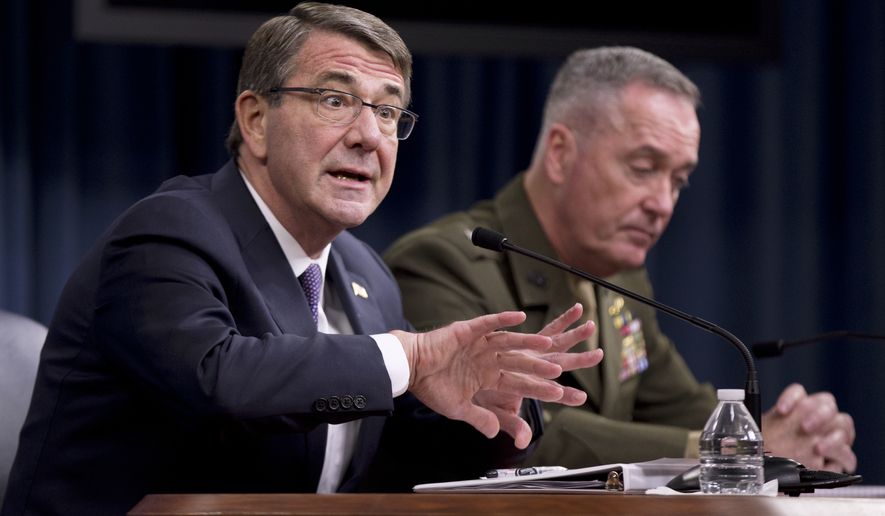Defense Secretary Ashton Carter said on Friday that forces have killed the Islamic State’s finance chief as part of an improving campaign to identify the terror army’s chieftains “so we can kill them.”
“We are systematically eliminating ISIL’s cabinet,” Mr. Carter told reporters at the Pentagon, referring to the group by an alternative name.
Appearing with Gen. Joseph Dunford, the Joint Chiefs Chairman, the defense secretary’s bullish remarks seemed to be aimed at assuring allies that the U.S. is making progress in the war even though the Islamic State was able to carrying out another horrific attack in Europe. The bombings at the Brussels airport and on a subway car killed over 30 and wounded more than 250.
President’s Obama did not let the carnage alter in any way his trips to Cuba and Argentina. This brought criticism from pro-war conservatives that the commander-in-chief appears aloof as ISIL is broadening its deadly reach into Europe.
Mr. Carter’s argument on Friday was that the Pentagon remains engaged in a war designed to remove ISLI’s so-called caliphate in Iraq-Syria.
He declined to assert that the U.S has turned a corner, instead saying, “The momentum of the campaign is now clearly on our side.”
He said the more American war planners learned about how ISIL does its killing business and who its leaders are, then the more the coalition can mount air strikes and support local ground operations.
“We’ve learned a great deal, and we continue to learn about who is who in ISIL so we can kill them, about how they get their finances so we can dry that up,” Mr. Carter said. “And the forces that we’re working with on the ground in both Iraq and Syria continue to gather strength because our strategic approach for the re- taking of territory is to help local forces to do so.”
Earlier this month, the U.S. announced the killing of ISIL’s war minister.
Still, Mr. Carter conceded, “Striking leadership is necessary but as you know it is far from sufficient. Leaders can be replaced. However, these leaders have been around for a long time. They are senior, they’re experienced, and so eliminating them is an important objective and it achieves an important result.”
The goal is to separate ISIL’s so-called capital of Raqqa, Syria, from its operations in Iraq, with the next big objective the invasion of terrorist-held Mosul.
“In both Syria and Iraq, we’re seeing important steps to shape what will become crucial battles in the months to come,” he said.
One such move was to set up a Marine Corps fire base in Makmour, in northern Iraq, with its artillery supporting Kurdish and government forces who are trying to take villages near Mosul. Makmour is about 60 miles southeast of Iraq’s second largest city.
“This is not a fundamental shift,” said Gen. Dunford, when asked if the U.S. is now expanding its role, after the Obama administration has said it will not get involved directly in fighting on the ground.
“The Iraqi Security Forces are the ones carrying out the assaults,” Mr. Carter said.
Mr. Carter has felt heavy criticism from Sen. John McCain, Arizona Republican, for not accelerating a plan to capture Raqqa , the ISIL nerved center which plans attacks overseas and recruits thousands of foreign fighters from over 100 countries.
Mr. Carter identified the killed finance minister as Haji Imam.
“The removal of this ISIL leader will hamper the organization’s ability for them to conduct operations both inside and outside of Iraq and Syria,” Mr. Carter said.
Imam is a longtime jihadist who once served under Abu Musab Zarqawi, a Jordanian who founded al Qaeda in Iraq and was killed by a U.S. air strike in 2006. Abu Bakr al-Baghdadi, the founder and current leader of ISIL, also served under Zarqawi, a particularly violent terrorist.
• Rowan Scarborough can be reached at rscarborough@washingtontimes.com.




Please read our comment policy before commenting.